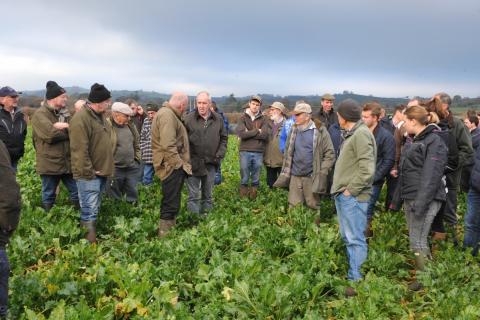29 November 2018
Welsh suckler beef producers must match cow breed to their farm environment as an important first step to profitable production.
During a Farming Connect open day at Newton Farm, near Scethrog, Brecon, beef specialist Rhidian Jones said it was common for Welsh hill and upland farms to choose the wrong breed of cow for their situation.
“Some have changed to Continental breeds to get a high value calf but this can sometimes come at the price of poor fertility, difficult calvings and high feed costs,’’ Mr Jones told farmers attending the event.
At Newton Farm, a Farming Connect Demonstration Farm, farmers Richard and Helen Roderick and their family are switching from Limousin-cross and Belgian Blue-cross cows to Stabilisers; in 2019 they will calve 94 cows and heifers – heifers calve at two years old.
An initial reason for the change was to move to a self-replacing easy calving herd using a docile maternal breed capable of thriving on forage and an outwintering system.
The herd is suited to grazing grass or fodder beet for most of the year so the Rodericks’ have lowered their feed costs.
In 2018, heifers were artificially inseminated and ran with a sweeper bull for nine weeks, while the cows ran with bulls for 76 days. Scanning results have shown 94 out of 96 animals to be in calf, with at least two carrying twins.
Calving index – a good measure of fertility and compact calving – has reduced from 400 days to 365. In 2018 73% calved in the first three weeks, with 96% of cows calved in the first six weeks.
The heifers averaged 256kg at weaning, at 46% of their mothers’ bodyweight while the bulls, which were introduced to creep at four months old, weighed in at 316kgs, 52% of dam bodyweight.
“Maintenance is one of the biggest costs of keeping a cow, if you have a 700kg cow she will need a lot more maintenance than a 600kg cow,’’ said Mr Jones.
The 2016/17 Welsh Farm Business Survey shows that for the top third performing upland suckler herds, the gross margin per cow is £599 compared to £420 for the average performing herd.
“It is not easy to make money out of suckler cows but those who are doing it well are making £179 more per cow than the average,’’ Mr Jones pointed out.
There are several factors that must combine to achieve that, not least the body condition of the cow.
“You don’t want cows to be too fit at calving, aim for a body condition score (BCS) of between 2 and 2.5 but you want them on a rising plane of nutrition when they get out to grass. The right sort of cow will put on condition at grass more easily,’’ advised Mr Jones, of RJ Livestock Systems.
“You want them in a relatively lean condition to calve but rising to go back to the bull for good conception rates. Mating at BCS 2.5 to 3 gives the best results.’’
Many suckler producers calve their herds too early for grass growth which means keeping cows and young calves housed, putting calves at risk of disease and incurring higher feed costs compared to animals at grass.
“If cows are housed after calving they have a shorter period of time to recover condition on good quality grass before going back to the bull,’’ said Mr Jones.
He recommends using Estimated Breeding Values to select animals with good maternal traits – for example maternal calving ease which is relevant to producers breeding their own replacements.
Milk production figures are important too, Mr Jones added. “A calf will grow quicker on milk than anything else so having a milky mother is crucial.’’
Creep feeding can also have its place, he suggested. “Creep feeding helps the rumen to develop and calves have high feed conversion rates at that age so you will get a return on your investment.’’
The Rodericks keep a check on winter feeding costs by running cows and heifers on 12 acres of fodder beet which costs around 80p/animal/day.
Marc Jones of ADAS, who also grows fodder beet on his own farm at Trefnant Hall, near Welshpool, led discussions at the open day on the considerations for grazing livestock on fodder beet.
Sarah Hughes, Farming Connect Red Meat Technical Officer (South Wales), said we have undertaken a number of projects at Newton Farm including the ones discussed at this event on suckler herd’s efficiency and winter feeding options, more detailed information on the projects are available on the Farming Connect website.
“Farming Connect works with a network of demonstration farms across Wales in demonstrating and trialling new management techniques and technology, to provide farmers with the knowledge to make informed decisions and perhaps implement similar approaches on their own farms, and hopefully improve their businesses,’’ she said.
Farming Connect provides farmers with a range of subsidized or fully funded services through its Advisory Service. Herd health vouchers of £150 per business are also available.
Funding for the project has been provided by the Welsh Government’s Rural Communities Rural Development Programme 2014-2020.

